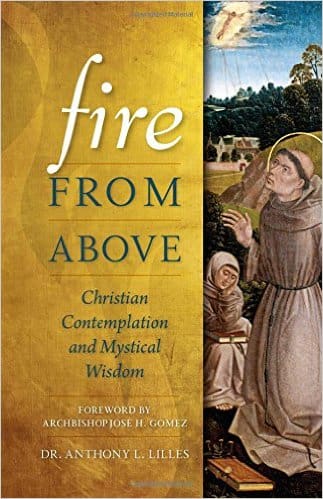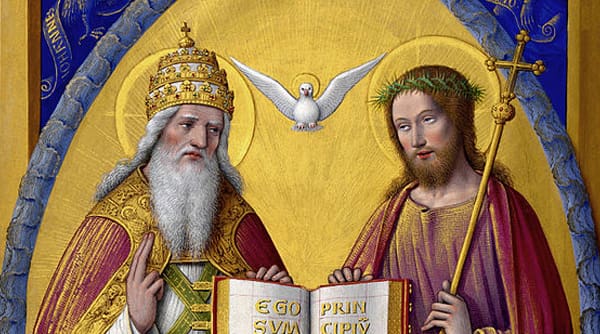How Sanctifying Grace Makes us Like God
With the Gift of the Holy Spirit, the gift of supernatural grace makes one’s whole existence holy. This doctrine of deification, or divinization, involves a true sharing in God’s life that does not diminish our created dignity but raises our freedom above its natural capacities.
To be assimilated into the life of God in a way that perfects our humanity, the human person, as a creature, needs a gift that elevates, transforms, and unites it to the Holy Trinity. Sanctifying grace given through a new presence of the Holy Spirit in the soul is a participation in the life of God in the sense that it implicates and lifts up the very substance and nature of what it means to be a human being in the very life of God.
The theological tradition says that this sharing in divine life has a physical, formal, analogous, and accidental character. This seems odd to affirm and can easily be misunderstood. A proper understanding of these terms, however, opens up the mystery of sanctifying grace and protects it from dangerous and reductionist lines of reasoning.
We say that grace is an accidental participation in the life of God because even those who do not know God and who have rejected grace still have a soul and remain in the Divine Image. Whether or not someone has the gift of grace, his life is sacred and his dignity calls for respect. Furthermore, sanctifying grace does not physically change a human being into a wholly different creature. Human nature receives the life of God as a secondary reality, a second nature. This means that grace builds up and perfects humanity but does not replace it. This also means that as we accept the gift of grace, our frailty and inadequacy do not magically disappear. Instead, through grace we discover in our weaknesses that the power of God is brought to perfection (see 2 Cor. 12:9).
Why do we affirm that grace is an analogous participation in divine life? Analogous refers to the true relation, the harmony, the due proportion that grace establishes between creatures and God. Grace does not make us God by nature. If it did, we would cease to be human; we would cease to be at all. There would be no question of harmony or relation between humanity and divinity, between creation and creator.
To be analogous, to be in harmony, to be in due proportion requires that the soul who freely accepts sanctifying grace perfects its unique individuality before God. Affirming that grace is an analogous participation in the life of God is therefore essential for understanding justification. Grace, because it is analogous, gives real standing before God, because without standing there is no real relation. The gift of God is an analogous participation in the life of God insofar as it brings new and deeper meaning to the personal existence of the believer, establishing a real relation, while animating, healing, and perfecting the uniqueness of the individual before the Lord.
The more infused our humanity is with divine life, the greater our union with God and at the same time, the more fully human we become. Grace makes us like God to unite us to Him. This increased likeness does not diminish our humanity, and our union with God does not deprive us of our freedom. Instead the closer we draw to God, the greater freedom we enjoy, and the more we are like Him, the more the uniqueness of who we are delights His heart.
An analogous participation in God’s life opens up an understanding of relational mysticism that stands over and against various mysticisms of identity. Many systems propose an absolute being or absolute emptiness that either absorbs or annihilates the individual soul. In pantheistic systems, like that proposed by Hegel, the value of the individual is only its part in an overall process. Here, a measurable outcome yet to be realized surmounts the uniqueness of the individual: no soul is to be saved, but instead individual freedom must be overcome, made to conform. Our participation in God’s life, on the contrary, is not about mere compliance, but about a tender friendship with God, a sacred solidarity with the whole reality of heaven.
What do theologians mean by the term physical? In this context, physical does not mean simply something visible or bodily or material but instead refers to something invisible and spiritual. Grace works not extrinsic to the soul’s natural powers, but intrinsically through them, renewing the soul’s very substance. God’s nature does not impose itself from without but lifts up and expands the soul’s interiority so that the Divine Persons might dwell in it.
To participate physically in the life of God implies that the soul can be animated by a life infinitely deeper and fuller than the one that is its own by nature. It can have a second nature, a new nature within its nature, a life that is “not my own” (cf. Gal. 2:20). In the life of grace, frail human nature is physically caught up in and transformed by the immensity of divine life.
How is grace a formal participation in divine life? The form of grace is divine — it comes from God and is in God, not man. To say participation in divine life is formal affirms that the grace that makes us holy is a higher reality, above our human nature, capable of lifting our created nature into the very life of God. Divine life is a gift that is over the soul, above human existence, and its divine form lifts the soul above the limits of human nature without harming the integrity of our humanity. To say that grace is a physical and formal participation in the life of God is to say that all that is most noble, good, and true about being human is under the influence of this higher power.
This kind of participation in divine life subordinates everything that can be felt and touched, understood and imagined in human existence so that nothing can separate us from the love of God. New powers of faith, hope, and love, infused virtues, and an array of spiritual gifts lift merely human works above themselves. The grace that makes us holy elevates, transforms, and unites to God that part of us that is deeper than our bodily existence and even our psychological powers, so that through cooperation with the Holy Spirit, we can actually give praise to God. Thus, grace as a physical and formal sharing in God’s life refers to those depths and horizons of human existence and being that no science can adequately measure or examine.
Sanctifying grace involves the deepest center of the soul, reaching deeper into our human substance than any feeling, any enlightened state of consciousness, or any attitude, although it can influence all of this in the powers of the soul. This gift of holiness is an intrinsic principle at work within our nature: not an external force, not an extrinsic influence, not a power imposed over and against the natural greatness of humanity. In the very center of our being is where God physically implicates our frail human “I” with His omnipotent divine “Thou,” tenderly setting apart the very substance of who we are, subtly consecrating our very life-principle itself so that we can offer our bodies as a living sacrifice of praise.
In the form of heavenly things, the grace that makes us holy involves a sacrificial self-emptying of our humanity and a divinely humble lifting up of our frailties. Not limiting itself to the greatest and most powerful, the perfection of this eternal life is revealed in our weakness and failures. It is not the product of human effort or industry, but of trust and complete surrender. Only Uncreated Love can create this new life in the soul, but to do so, the soul must die to itself out of devotion to its crucified Master.
Through this blessing from above, God reveals His glory while protecting the integrity of human nature. Sanctifying grace raises the wonder of human dignity, helping man and woman see the greatness of each one’s created purpose. This gift from above commits the saint more deeply to promoting what is good and noble in the created order even as he is drawn closer to the Lord’s uncreated mystery.
+
This article is from a chapter in Fire from Above, which is available through Sophia Institute Press. 
Art for this post on sanctifying grace: Detail of La Sainte Trinite (The Holy Trinity), Jean Bourdichon, 1503-1508, PD-US author’s life plus 100 years or less, Wikimedia Commons. Cover of Fire from Above, used with permission.




